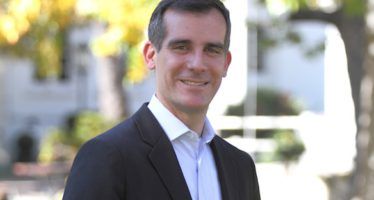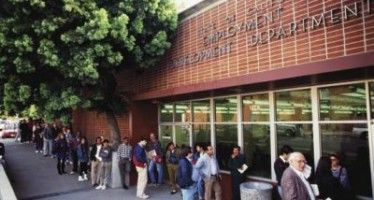ICE seeks to defy intent of state law on detention centers

Democratic lawmakers are harshly criticizing the Trump administration’s attempt to defy the intent of a new state law banning privately run prisons and detention centers.
On Oct. 11, when Gov. Gavin Newsom signed Assembly Bill 32, liberal activists rejoiced. Private prisons are considered far more likely to be inhumane and generally use non-union workers. Private detention centers holding unauthorized immigrants are seen as a symbol of the Immigration and Customs Enforcement (ICE), the federal agency that has become a target for the left since President Donald Trump’s election.
But while the law takes effect Jan. 1, it allows existing contracts to be honored. Five days after Newsom’s signing of AB32, ICE put out a solicitation on the Federal Business Opportunities website for contractors to run detention centers in the general areas of Northern California, Los Angeles and San Diego that had a total of 5,000 beds.
A month later, California Sens. Dianne Feinstein and Kamala Harris and 19 fellow Democrats in the Golden State’s House of Representatives delegation are crying foul. They say ICE is flouting normal procedures in an attempt to ensure three existing facilities keep operating.
“Given the timing and terms of this solicitation – particularly in light of ICE’s history of suspect contract activities and insufficient oversight – we are understandably concerned that the solicitation is intended to favor incumbent contractors,” the 21 Democrats wrote in a letter to several federal agencies. “If so, these efforts would be in direct contradiction with the spirit of full and open competition required by federal procurement law.”
The solicitation asked for interested parties to respond within two weeks instead of the usual 30 days. It also specified that bidders had to have “turnkey ready” facilities with specific ranges of available beds. The contracts are for five years, with the option for two five-year extensions.
Democrats say bidding process is rigged
Democrats said this ensured that the only applicants would be the three companies that are already running federal immigration detention centers in California: GEO Group, which has centers in Adelanto in the Inland Empire and Bakersfield; CoreCivic, which runs a center in San Diego; and the Management and Training Corp., which has one in Calexico in Imperial County, east of San Diego.
ICE signed a $62 million contract with GEO for the Adelanto facility in March in which GEO was the only bidder. Democrats didn’t object to the contract at the time but now say it also was awarded in a way that violated the spirit of federal procurement laws by essentially ensuring only one company had a chance to win.
But an ICE official told the Palm Springs Desert Sun that the agency “remains compliant with federal contract and acquisitions regulations, as we advertise opportunity notices and subsequently implement the decision process.”
AB32’s author – Assemblyman Rob Bonta, D-Oakland – blasted ICE in comments to the Desert Sun, saying the agency was attempting to “circumvent the will of the people of California.”
ICE’s parent agency – the Department of Homeland Security – has a history of claiming more flexibility under federal rules than its critics say it has. The same goes for the Trump administration, most notably in its use of $6.1 billion in defense funding to build sections of a border wall without congressional authorization.
In their letter to DHS and other agencies, the California Democratic lawmakers asked for information on how ICE crafted its solicitation for detention center bids.
Their chances of getting a quick response are unclear. ICE has long faced criticism over its handling of public record requests, which it is supposed to respond to in 20 days or less. The agency was sued earlier this month by the Project on Government Oversight for allegedly withholding information over how it used facial recognition and other technology in surveillance and data collection programs.
Chris Reed
Chris Reed is a regular contributor to Cal Watchdog. Reed is an editorial writer for U-T San Diego. Before joining the U-T in July 2005, he was the opinion-page columns editor and wrote the featured weekly Unspin column for The Orange County Register. Reed was on the national board of the Association of Opinion Page Editors from 2003-2005. From 2000 to 2005, Reed made more than 100 appearances as a featured news analyst on Los Angeles-area National Public Radio affiliate KPCC-FM. From 1990 to 1998, Reed was an editor, metro columnist and film critic at the Inland Valley Daily Bulletin in Ontario. Reed has a political science degree from the University of Hawaii (Hilo campus), where he edited the student newspaper, the Vulcan News, his senior year. He is on Twitter: @chrisreed99.
Related Articles
SMUD’s Creative Rate Increase Lingo
Katy Grimes: The Sacramento Municipal Utility District is changing some of its rate terminology in order to charge higher rates. The
L.A. headaches hang over Garcetti’s White House ambitions
Sen. Kamala Harris, 53, isn’t the only relatively young California Democrat who’s seen as a potential fresh-faced alternative to Massachusetts
Rare candor on CA joblessness — but not in Times or Bee, of course
With nearly one in five California adults who want to work full-time unable to find such a job, it should




